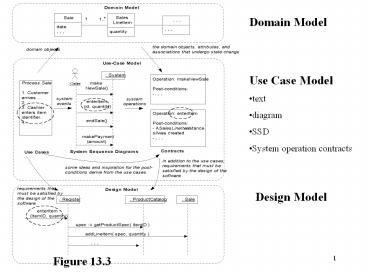Domain Model - PowerPoint PPT Presentation
1 / 12
Title: Domain Model
1
Domain Model
- Use Case Model
- text
- diagram
- SSD
- System operation contracts
Design Model
Figure 13.3
2
Contracts
- A technique for describing system operations in
terms of state changes to objects in a Domain
Model - major proponent - Bertrand Meyer
- based on concept of assertion
- a statement, a declaration, that must be true
- a false value indicates a bug
- UML has OCL - very formal syntax which we will
ignore
3
Contracts
- Consider the execution of a routine
- The called routine provides a service - it is the
supplier - The caller is the client requesting the service.
- A contract will spells out precisely the
obligations of the caller (client) and the
callee (supplier). - The contract serves as an interface specification
for the routine. - Example consider a routine that merges two
sorted sequences. The merge routine is the
supplier of the service the calling routine is
the caller. A contract will spell out the
responsibilities of each party.
4
Responsibilities
- Client Ensure that the both of the sequences to
be merged are each already sorted - Supplier Efficiently merge the two sorted
sequences into one sorted sequence - Software contract
- The responsibilities of the client will be called
pre-conditions - The responsibilities of the supplier will be
called post-conditions
5
- During analysis developers must first understand
the problem domain and identify domain objects,
their relationships with other domain objects,
and their constraints. - If a contract is defined in terms of domain
objects the constraints can be clear and
explicit, easily understood - Everyone understands the business contracting
metaphor. - Business rules (constraints) can become an
integral part of the software from the very
beginning. - Example consider a withdraw method for an
ACCOUNT class withdraw (amount_to_withdraw
MONEY)
6
- Example consider a withdraw method for an
ACCOUNT class - withdraw (amount_to_withdraw MONEY)
- Pre-conditions
- positive_amount amount_to_withdraw gt 0
- sufficient_balance balance gt amount_to_withdraw
- Post-conditions
- correct_balance balance old balance -
amount_to_withdraw end
7
Contracts
- Contract Components (Ch 13)
- Operation - name and parameters
- Cross References - where operation used
- Preconditions - assumptions about the state of
the system or Domain Model objects - Postconditions - state of objects after the
operation completes - objectsany new ones? any attributes modified?
- associations any new or modified associations?
- Larmans version is very informal
8
SSD for a samplePOS Use Case Figure 13.1
Input Events invoke a system operation of the
same name same idea as in object-oriented
programming when we say a message foo invokes the
method foo
Referred to as the enterItem system operation
9
The part of the Domain Model relevant to
enterItem( )
1
Described by
1..
Contained in
1
10
Contracts
Example Operation enterItem (itemID ItemID,
quantity integer) Cross References Use Case
Process Sale Preconditions There is a sale
underway Postconditions - a SalesLineItem
instance was created - an association between the
sale and the sales line item was created - an
attribute, quantity, was modified - an
association between the product specification and
the sales line item was created
11
OCL
- Object Constraint Language
- UML has a formal language for specifying
constraints on object-oriented models
context Salesperson sell ( item Thing )
Real pre self.sellableItems -gt includes
(item) post not self.sellableItems -gt includes
(item) and resultitem.price
12
Design By Contract (DBC) provides the basis for
documenting software interfaces Reusers of a
software component need to understand what the
software provides them and what they must do to
obtain these benefits. This is the contract. DBC
is perhaps a best non-practice. Example of a new
contracting tool iContract Design by Contract
in Java http//www.javaworld.com/javaworld/jw-02-
2001/jw-0216-cooltools.html

